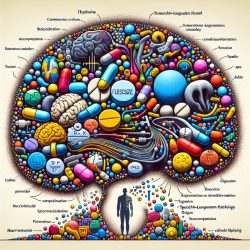Introduction
In the quest to enhance therapeutic outcomes for various conditions, groundbreaking research often sheds light on unexpected connections. One such study, "Fluoxetine Protection in Decompression Sickness in Mice is Enhanced by Blocking TREK-1 Potassium Channel with the 'spadin' Antidepressant," explores the intriguing intersection of antidepressants and decompression sickness (DCS). As practitioners focused on data-driven decisions, it's crucial to delve into these findings to potentially improve therapeutic strategies.
Understanding the Research
Conducted by Vallée et al., the study investigates the effects of fluoxetine, a well-known antidepressant, on decompression sickness in mice. The research highlights that fluoxetine, when combined with the blockade of the TREK-1 potassium channel using spadin, significantly enhances protection against DCS. This is particularly noteworthy because TREK-1 channels are generally considered neuroprotective.
The study involved administering fluoxetine to wild-type (WT) and TREK-1 deficient mice, followed by a decompression protocol. The results were striking: only 7% of TREK-1 knockout mice treated with fluoxetine succumbed to DCS, compared to 62% in untreated WT controls. The combination of fluoxetine and spadin further reduced mortality to 4%.
Implications for Practitioners
These findings open up new avenues for practitioners, especially those working with populations at risk of ischemic conditions. Here are some potential implications:
- Reconsidering Antidepressant Use: While fluoxetine is primarily used for depression, its potential protective effects against DCS suggest it might be beneficial in other contexts involving ischemia and inflammation.
- Exploring TREK-1 Inhibition: The study indicates that inhibiting TREK-1 channels can enhance the protective effects of fluoxetine. This could lead to novel therapeutic strategies for conditions where neuroprotection is paramount.
- Further Research: Encouraging further research into the mechanisms by which fluoxetine and TREK-1 inhibition confer protection could lead to breakthroughs in treating ischemic conditions.
Encouraging Further Research
The study underscores the importance of continued research into the multifaceted roles of antidepressants like fluoxetine. By exploring their effects beyond traditional psychiatric applications, we can uncover new therapeutic potentials. Practitioners are encouraged to stay informed about such developments and consider the broader implications of these findings in their practice.
To read the original research paper, please follow this link: Fluoxetine Protection in Decompression Sickness in Mice is Enhanced by Blocking TREK-1 Potassium Channel with the “spadin” Antidepressant.










